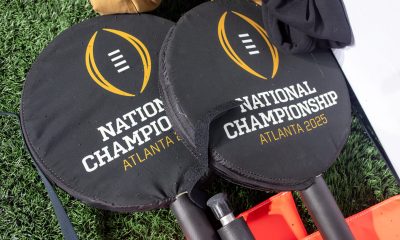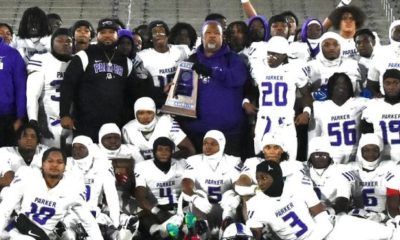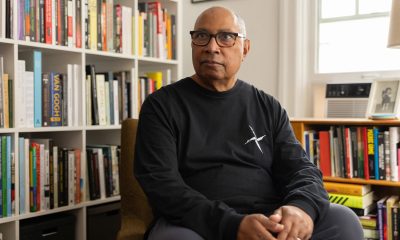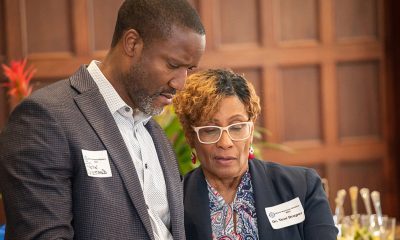Sports
Shaka Smart Leaving VCU to Coach Texas

Former VCU head coach Shaka Smart looks on during the first half of an NCAA college basketball game against Saint Louis, Saturday, March 1, 2014, in Richmond, Va. (AP Photo/Jason Hirschfeld)
HANK KURZ Jr., AP Sports Writers
JIM VERTUNO, AP Sports Writers
AUSTIN, Texas (AP) — Shaka Smart has been a hot coaching commodity since leading Virginia Commonwealth to the Final Four in 2011. He had reportedly shunned several big-time offers, but the lure of Texas was finally too much to turn down.
Texas officials formally announced the hiring of Smart as the Longhorns’ new basketball coach Friday and expect to introduce him at a news conference on campus. The announcement from Texas came a day after Smart met with athletic director Steve Patterson in Richmond, Virginia, to strike a deal.
Smart met with VCU players Thursday evening at the Siegel Center, the team’s home arena, and at least one player was seen crying when he left.
Smart, who has won at least 26 games in each of his six seasons at VCU, is bolting for a Texas program that hasn’t been able to unseat Kansas atop the Big 12. But the Longhorns also boast the wealthiest athletic department in the country and easy access to some of the nation’s most fertile recruiting grounds in Dallas and Houston.
Smart replaces Rick Barnes, who was fired last weekend after 17 seasons.
Terms of Smart’s contract were not immediately released and VCU said a statement would be released Friday. Barnes made $2.62 million last season, while Smart made $1.8 million with the Rams.
Patterson had zeroed in on bringing Smart to Texas immediately after firing Barnes.
Smart did not speak to the media gathered Thursday and VCU players were escorted from the building by university public relations without offering comments.
That Barnes was pushed out shows Patterson, a former NBA executive, expects big things from basketball. Barnes won three Big 12 titles and recruited elite talent to Austin. Former Longhorns T.J. Ford (2003) and Kevin Durant (2007) won national player of the year honors.
But the program had plateaued and the early-round exits in the NCAA Tournament started to mount, despite rosters full of future NBA talent.
At VCU, Smart took over a program that had had great success under Jeff Capel, and then Anthony Grant. He hopes to avoid the pitfalls at Texas that his predecessors encountered when they left to take over programs at universities considered “football schools.”
Capel lasted five years at Oklahoma before being fired, and Grant spent six at Alabama before he was dismissed.
By leaving before May 1, Smart owes VCU a $500,000 buyout. His contract also contains a provision that if he became a head coach at another institution, that school would have to play VCU in a home-and-home series, or pay VCU $250,000.
Barnes led Texas to 16 NCAA Tournaments in 17 seasons but his teams haven’t made it out of the first weekend since 2008.
His best years came from 2003-2008, when Texas made its first Final Four in more than 50 years and twice more reached the tournament’s final eight. Texas also earned the program’s first No. 1 ranking in the 2009-2010 season.
Smart had some success right away at VCU when the Rams won the CBI postseason tournament in his first year.
But it was VCU’s monumental run in the NCAA Tournament the following year that really got Smart noticed. The Rams went from being a questionable selection, barely getting a bid and playing in the First Four in Dayton, Ohio, to beating five major-conference schools to reach the Final Four.
The Rams have been back in the NCAA Tournament each of the past four seasons, but were eliminated in the round of 32 in 2012 and 2013 and lost their first game in overtime each of the past two seasons.
Beyond the Final Four run, this year might have been Smart’s best coaching job at VCU.
The Rams lost Briante Weber, the leader of their “havoc” defensive style, on Jan. 31 to a knee injury, and played the last month and a half with scoring leader Treveon Graham bothered by a high left ankle sprain, sometimes even sidelined.
VCU (26-10) lost six of 10 late in the season, enduring its first three-game slide in Smart’s six seasons, before winning five straight, including four in four days, to win the Atlantic 10 title.
Smart’s 26 wins in six consecutive seasons is a feat matched only by Duke. With the interest he has generated in basketball, a $25 million basketball practice facility is under construction and scheduled to be ready for use in the fall.
___
Kurz reported from Richmond, Virginia.
Copyright 2015 The Associated Press. All rights reserved. This material may not be published, broadcast, rewritten or redistributed.
Alameda County
Seth Curry Makes Impressive Debut with the Golden State Warriors
Seth looked comfortable in his new uniform, seamlessly fitting into the Warriors’ offensive and defensive system. He finished the night with an impressive 14 points, becoming one of the team’s top scorers for the game. Seth’s points came in a variety of ways – floaters, spot-up three-pointers, mid-range jumpers, and a handful of aggressive drives that kept the Oklahoma City Thunder defense on its heels.

By Y’Anad Burrell
Tuesday night was anything but ordinary for fans in San Francisco as Seth Curry made his highly anticipated debut as a new member of the Golden State Warriors. Seth didn’t disappoint, delivering a performance that not only showcased his scoring ability but also demonstrated his added value to the team.
At 35, the 12-year NBA veteran on Monday signed a contract to play with the Warriors for the rest of the season.
Seth looked comfortable in his new uniform, seamlessly fitting into the Warriors’ offensive and defensive system. He finished the night with an impressive 14 points, becoming one of the team’s top scorers for the game. Seth’s points came in a variety of ways – floaters, spot-up three-pointers, mid-range jumpers, and a handful of aggressive drives that kept the Oklahoma City Thunder defense on its heels.
One of the most memorable moments of the evening came before Seth even scored his first points. As he checked into the game, the Chase Center erupted into applause, with fans rising to their feet to give the newest Warrior a standing ovation.
The crowd’s reaction was a testament not only to Seth’s reputation as a sharpshooter but also to the excitement he brings to the Warriors. It was clear that fans quickly embraced Seth as one of their own, eager to see what he could bring to the team’s championship aspirations.
Warriors’ superstar Steph Curry – Seth’s brother – did not play due to an injury. One could only imagine what it would be like if the Curry brothers were on the court together. Magic in the making.
Seth’s debut proved to be a turning point for the Warriors. Not only did he contribute on the scoreboard, but he also brought a sense of confidence and composure to the floor.
While their loss last night, OKC 124 – GSW 112, Seth’s impact was a game-changer and there’s more yet to come. Beyond statistics, it was clear that Seth’s presence elevated the team’s performance, giving the Warriors a new force as they look to make a deep playoff run.
Barbara Lee
WNBA’s Golden State Valkyries Kick Off Season with Community Programs in Oakland
“The Golden State Valkyries are more than a team—they’re a movement,” said Oakland Interim-Mayor Kevin Jenkins. “Their touchdown in Oakland marks a new era of opportunity, inspiration, and equity in sports. This partnership reflects our city’s deep commitment to uplifting women, investing in youth, and building a community where every dream has a place to grow. We’re proud to welcome the Valkyries to The Town.”
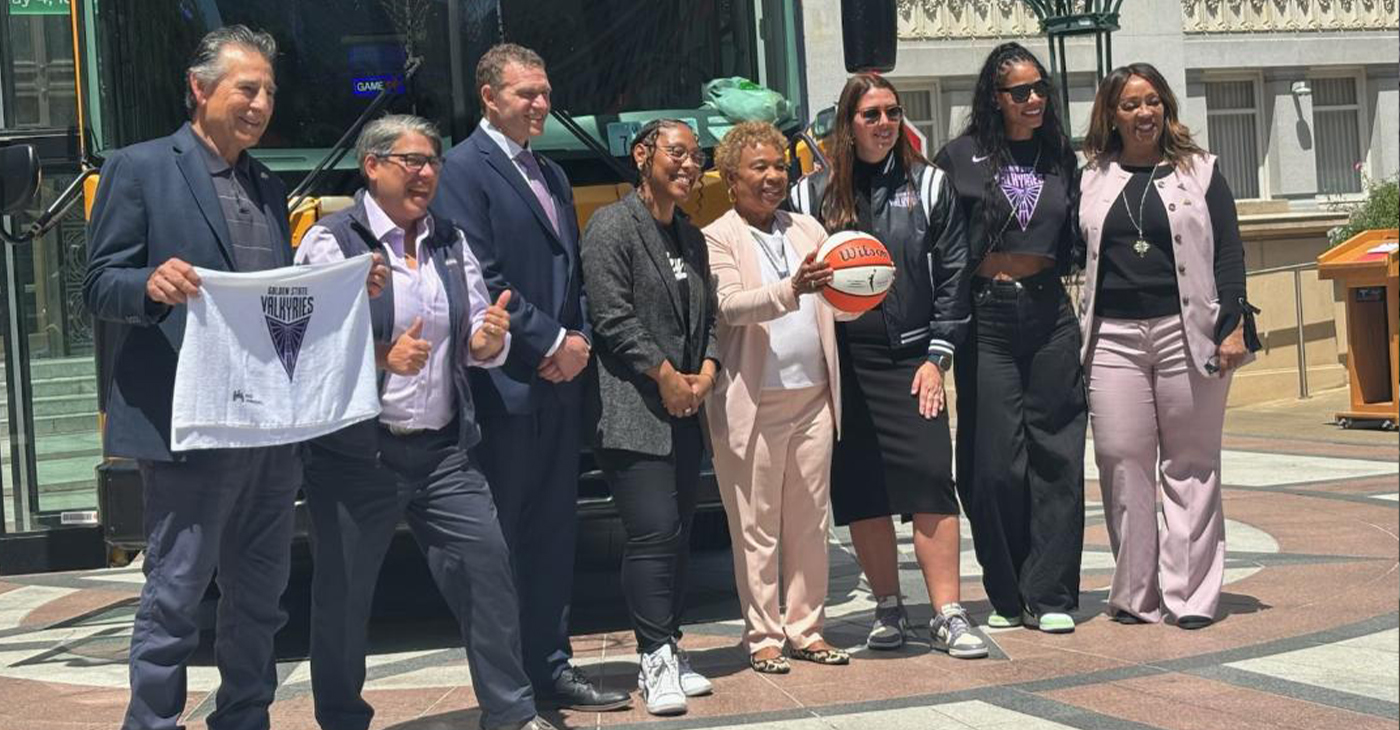
Team installs new nets at playgrounds, holds flag-raisings at City Halls in Oakland and S.F.
Special to The Post
The Golden State Valkyries brought the excitement of their inaugural season to every corner of the Bay Area with a full slate of community celebrations leading up to their historic home-opener against the Los Angeles Sparks at the Chase Center in San Francisco on Friday.
The week featured flag-raising ceremonies at city halls in Oakland and San Francisco, three “Violet Net” installation days at Oakland parks to encourage basketball play, fun “Hoopbus” takeovers at multiple schools presented by Kaiser Permanente, and player appearances.
“The Golden State Valkyries are more than a team—they’re a movement,” said Oakland Interim-Mayor Kevin Jenkins. “Their touchdown in Oakland marks a new era of opportunity, inspiration, and equity in sports. This partnership reflects our city’s deep commitment to uplifting women, investing in youth, and building a community where every dream has a place to grow. We’re proud to welcome the Valkyries to The Town.”
In total, 90 violet nets were installed on 45 basketball courts across 34 public parks throughout Oakland this week. A list of the parks receiving violet nets can be found at Valkyries.com.
About the Golden State Valkyries
The Golden State Valkyries, the WNBA affiliate of the seven-time NBA Champion Golden State Warriors, were announced as the 13th WNBA franchise on Oct. 5, 2023. According to Norse mythology, Valkyries are a host of warrior women who are fearless and unwavering – flying through air and sea alike.
This brand is Golden State’s modern interpretation of Valkyries: strong, bold, and fierce. Tipping off during the 2025 WNBA season, the team is headquartered in Oakland and will play home games at Chase Center in San Francisco. For Golden State Valkyries’ assets, including team logos, visit valkyries.com.
Activism
McClymonds High Names School Gym for Star Graduate, Basketball Legend Bill Russell
William “Bill” Felton Russell was born on Feb. 12, 1934, and died on July 31, 2022. He achieved fame as a U.S. professional basketball player who played center for the Boston Celtics of the National Basketball Association (NBA) from 1956 to 1969. He was the centerpiece of the Celtics dynasty that won 11 NBA championships during his 13-year career.
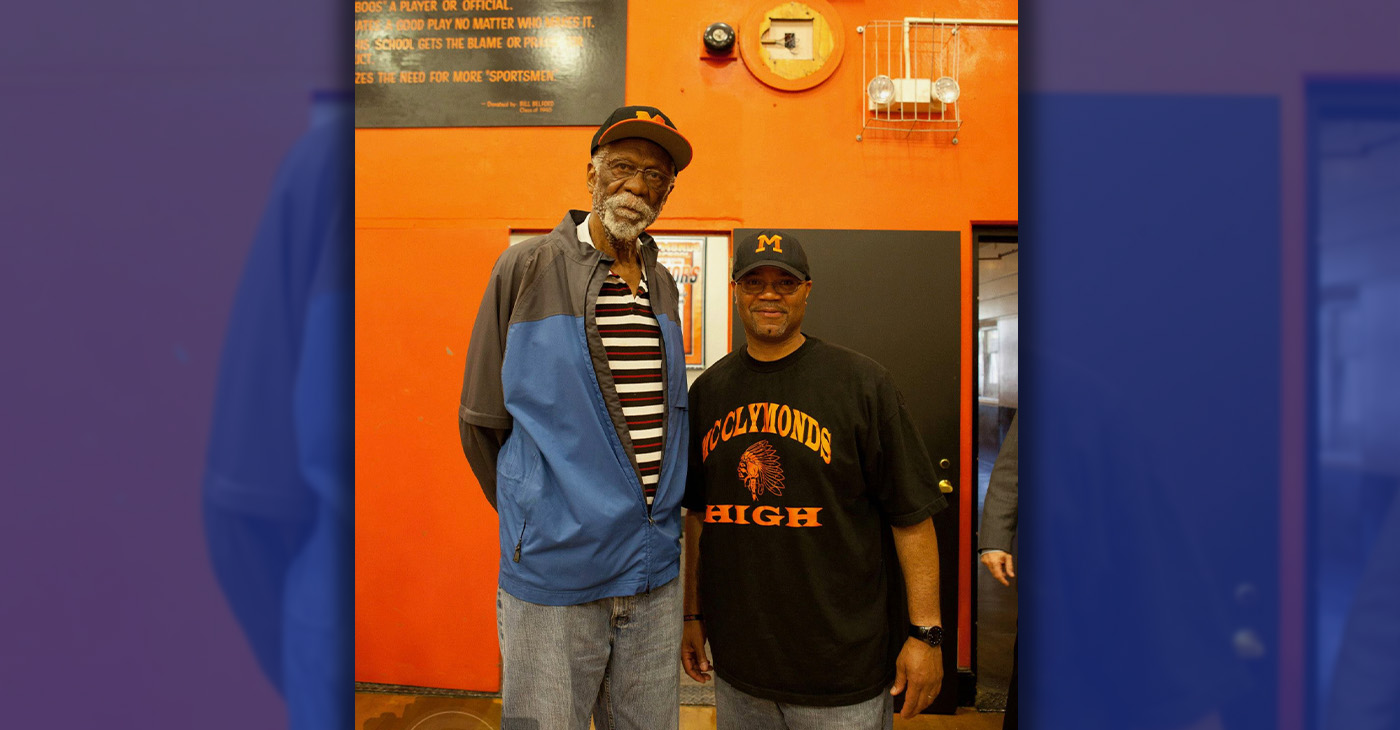
By Ken Epstein
West Oakland’s McClymonds High School, “the School of Champions,” this week named the school’s gymnasium in honor of one of its most famous graduates, basketball legend Bill Russell (class of ’52).
William “Bill” Felton Russell was born on Feb. 12, 1934, and died on July 31, 2022. He achieved fame as a U.S. professional basketball player who played center for the Boston Celtics of the National Basketball Association (NBA) from 1956 to 1969. He was the centerpiece of the Celtics dynasty that won 11 NBA championships during his 13-year career.
Russell is widely known as one of the greatest basketball players of all time. In 2011, he received the Presidential Medal of Freedom, the country’s highest civil honor, from President Barack Obama for Russell’s contributions to basketball and the Civil Rights Movement.
The McClymonds’ naming ceremony was held on Wednesday, the same day as Russell’s birthday. Oakland leader Bill Patterson, a longtime friend of Russell’s, was scheduled to cut the ribbon at the reopening of the gym, which had been closed for several months for renovation. Russell’s daughter Karen was scheduled to attend the ribbon cutting.
Russell’s name and signature are now printed on the gymnasium floor.
Patterson was working at DeFremery Park when he met Russell. “I befriended him as a boy and during his years at University of San Francisco” said Patterson. “We stayed friends for the rest of his life.”
Said McClymonds Principal Darielle Davis, herself a McClymonds graduate, “We are excited to honor Bill Russell for his sports accolades and because he broke color barriers. He is part of our legacy, and legacy is really important at McClymonds.”
Brian McGhee, community schools manager at McClymonds and former football player at UC Berkeley, said that Russell meant a lot to him and others at the school. “He was a beacon of light and hope for West Oakland,” he said. “He did a lot for sports and for civil rights.”
Starting in 2018, Ben “Coach” Tapscott worked with Patterson and other McClymonds grads, community members, and former coaches to encourage the Oakland Board of Education to endorse the naming of the school gym, which finally happened recently.
“We worked hard to make this happen,” said Tapscott. “He’s an important part of McClymond’s history, along with a lot of other famous graduates,” he said.
-

 Bay Area3 weeks ago
Bay Area3 weeks agoPost Salon to Discuss Proposal to Bring Costco to Oakland Community meeting to be held at City Hall, Thursday, Dec. 18
-

 Activism3 weeks ago
Activism3 weeks agoMayor Lee, City Leaders Announce $334 Million Bond Sale for Affordable Housing, Roads, Park Renovations, Libraries and Senior Centers
-

 Activism4 weeks ago
Activism4 weeks agoOakland Post: Week of December 10 – 16, 2025
-

 Activism3 weeks ago
Activism3 weeks agoOakland School Board Grapples with Potential $100 Million Shortfall Next Year
-

 Arts and Culture3 weeks ago
Arts and Culture3 weeks agoFayeth Gardens Holds 3rd Annual Kwanzaa Celebration at Hayward City Hall on Dec. 28
-

 Activism3 weeks ago
Activism3 weeks ago2025 in Review: Seven Questions for Black Women’s Think Tank Founder Kellie Todd Griffin
-

 Advice3 weeks ago
Advice3 weeks agoCOMMENTARY: If You Don’t Want Your ‘Black Card’ Revoked, Watch What You Bring to Holiday Dinners
-

 Activism3 weeks ago
Activism3 weeks agoAnn Lowe: The Quiet Genius of American Couture


